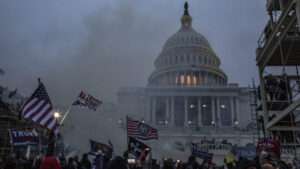The Volokh Conspiracy
Mostly law professors | Sometimes contrarian | Often libertarian | Always independent
January 6 and Insurrection - a Response to Ross Douthat
On Douthat's reasoning, published in the NY Times, Confederate secession wasn't an insurrection either.

In an article published today, New York Times columnist Ross Douthat responds to my and others' arguments that the January 6, 2021 attack on the Capitol qualifies as an "insurrection" under Section 3 of the Fourteenth Amendment. To his credit Douthat recognizes that uprisings much smaller than the Civil War - including the Whiskey Rebellion and Adolf Hitler's 1923 Beer Hall Putsch " - meet a reasonable definition of insurrection." As I have pointed out previously, these cases featured violence on roughly the same scale as the January 6 attack.
But Douthat nonetheless claims such cases "are obviously different from Jan. 6":
[T]he 14th Amendment disqualifies anyone who engaged "in insurrection or rebellion against the same" — with "the same" referring back to "the Constitution of the United States" in the prior clause. This wording tracks with my own understanding: What transforms a political event from a violent riot or lawless mob (which Jan. 6 plainly was) to a genuinely insurrectionary event is the outright denial of the authority of the existing political order and the attempt to establish some alternative order in its place.
There is no question that this is what the Munich Beer Hall Putsch set out to do….
[T]here was no such equivalent declaration when the QAnon Shaman ascended to the Senate rostrum; no serious claim of military or political authority made on behalf of the assembled mob, no declaration of a dissolved Congress and a new Trumpist Reich. Had there been — had, say, one of Trump's aides rushed to the Capitol and announced that Congress was disbanded and that President Trump was declaring a state of emergency and would henceforth be ruling by fiat — then the riot would have been transformed into an insurrectionary coup d'état. But nothing like that happened: The riot did not culminate in an attempt to depose the Congress; it dissolved before lawful authority instead, remaining a mob until the end.
The problem with Douthat's reasoning is that it implies the Confederates who were the original targets of Section 3 weren't insurrectionists either! Far from rejecting the Constitution and "denying the authority of the existing political order," they argued the Constitution gave their states a legal right to secede, and that Abraham Lincoln and the federal government were the ones acting illegally. Moreover, they had a much better legal rationale for their position than Trump supporters for the utterly indefensible claim that their man was the true winner of the 2020 election. Violently attempting to block the constitutionally required transition of power to the winner of a presidential election is pretty obviously an insurrection against the Constitution - even if the perpetrators don't explicitly say so. I go into these points in greater detail in a post published in September.
Douthat's theory also has the absurd implication that people trying to seize power by force can escape disqualification under Section 3 so long as they claim - however implausibly - that they are actually following the Constitution and their opponents are the true lawbreakers. You don't have to be a constitutional lawyer to see why that's an implausible conclusion - one that would set a dangerous precedent.


Show Comments (120)